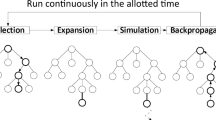Abstract
Agents in a large population are randomly matched to play a certain game, payoffs in which represent fitness. Agents may have preferences that are different from fitness. They learn strategies according to their preferences, and evolution changes the preference distribution in the population according to fitness. When agents know the preferences of the opponent in a match, only efficient symmetric strategy profiles of the fitness game can be stable. When agents do not know the preferences of the opponent, only Nash equilibria of the fitness game can be stable. For 2 × 2 symmetric games I characterize preferences that are stable.
Similar content being viewed by others
References
K. Basu J. Weibull (1991) ArticleTitleStrategy subsets closed under rational behavior Economics Letters 36 141–146
H. Bester W. Güth (1998) ArticleTitleIs altruism evolutionarily stable? Journal of Economic Behavior and Organization 34 193–209
Dekel E., Ely J. and Yilankaya O. (2004). Evolution of preferences, working paper Northwestern University, available at http://www. kellogg.nwu.edu/research/math/JeffEly/JeffEly/ (last accessed 24 June 2004)
J. Ely O. Yilankaya (2001) ArticleTitleNash equilibrium and the evolution of preferences” Journal of Economic Theory 97 255–272
R. Frank (1987) ArticleTitleIf homo economicus could choose his own utility function, would he want one with a conscience? American Economic Review 97 255–272
W. Güth H. Kliemt (1998) ArticleTitleThe indirect evolutionary approach Rationality and Society 10 377–399
W. Güth H. Kliemt B. Peleg (2000) ArticleTitleCo-evolution of preferences and information in simple game of trust German Economic Review 1 83–110
W. Güth M. Yaari (1992) Explaining reciprocal fairness in simple strategic games: An evolutionary approach U. Witt (Eds) Explaining Process and Change—Approaches to Evolutionary Economics The University of Michigan Press Michigan
S. Huck J. Oechssler (1999) ArticleTitleThe indirect evolutionary approach to explaining fair allocation Games and Economic Behavior 28 13–24
S. Hurkens (1995) ArticleTitleLearning by forgetful players Games and Economic Behavior 11 304–329
D. Levine (1998) ArticleTitleModeling altruism and spitefulness in experiments Review of Economic Dynamics 1 593–622 Occurrence Handle10.1006/redy.1998.0023
A. Matsui (1992) ArticleTitleBest response dynamics and socially stable strategies Journal of Economic Theory 57 343–362
E. Ok F. Vega-Redondo (2001) ArticleTitleOn the evolution of individualistic preferences: an incomplete information scenario Journal of Economic Theory 97 231–254
A. Possajennikov (2000) ArticleTitleOn the evolutionary stability of altruistic and spiteful preferences Journal of Economic Behavior and Organization 42 125–129
Possajennikov A. (2002), Cooperative prisoners and aggressive chickens: evolution of strategies and preferences in 2 × 2Games University of Mannheim S.FB 504 Discussion Paper 02–04, forthcoming in International Game Theory Review.
W. Sandholm (2001) ArticleTitlePreference evolution, two-speed dynamics, and rapid social change Review of Economic Dynamics 4 637–679
R. Sethi E. Somanathan (2001) ArticleTitlePreference evolution and reciprocity Journal of Economic Theory 97 273–297
J. Swinkels (1992) ArticleTitleEvolutionary stability with equilibrium entrants Journal of Economic Theory 57 306–322
Author information
Authors and Affiliations
Corresponding author
Additional information
Jel Codes: C72, A13
Rights and permissions
About this article
Cite this article
Possajennikov, A. Two-Speed Evolution of Strategies and Preferences In Symmetric Games. Theor Decis 57, 227–263 (2004). https://doi.org/10.1007/s11238-005-0282-z
Published:
Issue Date:
DOI: https://doi.org/10.1007/s11238-005-0282-z




